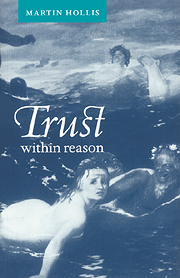4 - A remedy in the judgement and understanding?
Published online by Cambridge University Press: 06 January 2010
Summary
Hume's farmers are still about to lose both their harvests for want of mutual confidence and security. Although greater sympathy for one another might help, Hume is clear that sympathy is not enough. The problem set by our natural partiality is not solved by pointing out that we are often partial to our neighbours as well as to our friends. It is set by our natural inability to be impartial. To let us rise above this inconvenience of human nature and so overcome the perils of prudence, he therefore gives practical reason a twist.
He makes his move while discussing the origins of property and justice. Our natural sympathy and generosity are too limited to overcome the scanty provision which nature has made for our wants, he remarks, and too partial to ourselves to underpin the secure social framework needed if the benefits of cooperation are not to elude us. Hence all viable societies provide rules which secure ownership and an impersonal scheme of duties. These rules are artificial. In the Enquiry he notes the sheer variety of them in different societies and argues that, since the sentiments inherent in our universal human nature cannot account for it, the rules must be credited to reason and custom. In the Treatise he contends that our natural ideas of morality, far from counteracting our natural partiality, serve to reinforce it. Hence justice, which enjoins impartiality, is an artificial virtue and the remedy which it offers is an artificial remedy:
The remedy, then, is not derived from nature, but from artifice, or, more properly speaking, nature provides a remedy, in the judgement and understanding, for what is irregular and incommodious in the affections.
- Type
- Chapter
- Information
- Trust within Reason , pp. 63 - 81Publisher: Cambridge University PressPrint publication year: 1998



